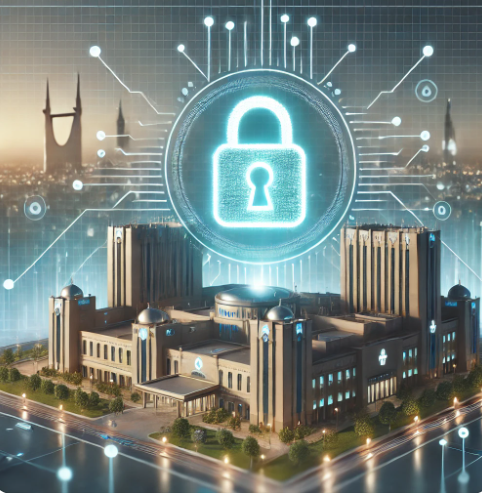How to Protect KSA’s Healthcare System from Rising Cyber Threats
The recent US cyberattack has again brought to the fore a rising issue: hospitals are increasingly becoming the target of cybercriminals. The attack, which hit hospitals run by Prospect Medical Holdings, crippled hospital computer systems, causing emergency rooms to close and ambulances to be rerouted. This frightening episode highlights the need for enhanced cybersecurity in healthcare globally, including in Saudi Arabia (KSA), where regulations like the Saudi PDPL emphasize data protection compliance.
The Emerging Risk to Healthcare Cybersecurity in KSA
As healthcare institutions in KSA are increasingly embracing digital solutions as per Vision 2030, the threat of cyberattacks has substantially increased, making adherence to the Saudi PDPL and other KSA PDPL compliance guides essential for protecting sensitive patient data. Hospitals are a target for cybercriminals because they hold a wealth of sensitive patient information. An effective attack can paralyze important medical functions, breach confidential health records, and result in financial and reputational loss.

Common Cyber Threats Facing Healthcare Institutions
Healthcare facilities in KSA face several cyber threats, including:
1. Ransomware Attacks
Hackers encrypt hospital files, demanding a ransom to restore access. These attacks can paralyze patient care and delay critical medical procedures.
2. Data Breaches
Unauthorized access to patient records can lead to identity theft, fraud, and regulatory penalties.
3. Distributed Denial of Service (DDoS) Attacks
Cybercriminals overwhelm hospital networks, disrupting online services and internal communications.
4. Phishing Attacks
Staff members inadvertently click on malicious links or download malicious files, providing hackers with access to hospital networks.
Strengthening Cyber Defenses: How KSA Hospitals Can Remain Secure
Securing healthcare systems against cyber attacks demands a proactive and multi-layered strategy. Below are important strategies that KSA hospitals must adopt:
1. Invest in Strong IT Infrastructure
A secure IT system is the cornerstone of healthcare cybersecurity. Hospitals need to update systems periodically, utilize encrypted communication media, and implement robust firewalls and antivirus solutions to avoid cyber breaches.
2. Improve Employee Awareness and Training
Human mistakes are still the weakest link in cybersecurity. Timely training in recognizing phishing, robust password control, and proper handling of patient information can reduce risks substantially.
3. Implement Multi-Factor Authentication (MFA)
Applying MFA introduces a second level of security to verify that authorized users only are granted access to core hospital systems and patient records.
4. Use Strong Data Protection Policies
Data governance policies in hospitals must be stringent to protect sensitive patient data, ensure they are safely stored, accessible by authorized staff, and periodically backed up against the loss of data in the event of an attack.
5. Regular Security Audits
Regular vulnerability scans and penetration testing enable weaknesses to be found in a hospital’s cybersecurity system so that they can be addressed early enough to forestall their exploitation by hackers.
6. Utilize AI and Advanced Threat Detection
Deploying artificial intelligence (AI) and machine learning resources can enable hospitals to sense out-of-pattern activities in their networks to avoid cyberattacks before they result in harm.
7. Develop Incident Response and Recovery Plans
Having a properly documented incident response plan ensures that hospitals are able to rapidly contain and recover from cyberattacks, reducing downtime and safeguarding patient care.
Collaboration is Key: Standing Together Against Cyber Threats
To enhance cybersecurity in KSA’s healthcare industry, collaboration among hospitals, IT professionals, and cybersecurity companies is critical. This involves:
1. Sharing Threat Intelligence
Healthcare facilities should share intelligence on cyber threats and best practices to remain one step ahead of attackers.
2. Personalized Security Solutions
Personalized cybersecurity measures that meet the unique requirements of healthcare centers can provide better protection.
3. Regulatory Compliance
Compliance with national and international cybersecurity laws ensures hospitals have high-security standards.
Conclusion
As cyberattacks continue to rise, protecting KSA’s healthcare system should be a priority. By investing in IT infrastructure, educating healthcare workers, having tight security protocols, and encouraging partnership, hospitals can establish a solid defense against cyberattacks. With digital healthcare as the future, safeguarding patient information and keeping medical services flowing uninterrupted is no longer an option — it’s necessary.
- Questions and Answers
- Opinion
- Motivational and Inspiring Story
- Technology
- Live and Let live
- Focus
- Geopolitics
- Military-Arms/Equipment
- Security
- Economy
- Beasts of Nations
- Machine Tools-The “Mother Industry”
- Art
- Causes
- Crafts
- Dance
- Drinks
- Film/Movie
- Fitness
- Food
- Games
- Gardening
- Health
- Home
- Literature
- Music
- Networking
- Other
- Party
- Religion
- Shopping
- Sports
- Theater
- Health and Wellness
- News
- Culture

